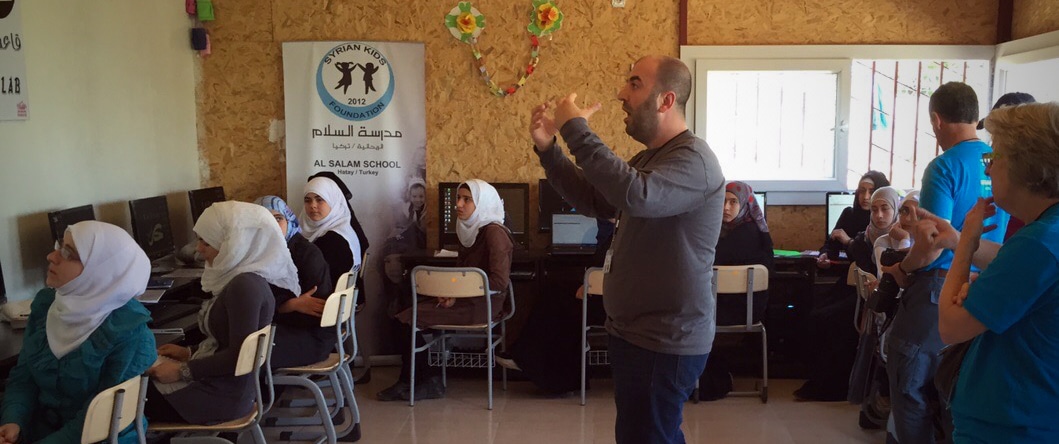Foreword by Josh Swihart, Electric Coin Company:
Shortly after the Crypto Community Project in August 2019, I received a message from Moe Ghashim. He had read about the pilot in a Coindesk article.
Later this year, Moe will run a similar program — 5,000 miles away from the South Bronx — for Syrian refugees living in Turkey. He wanted to collaborate.
Moe told me his story. He is a Syrian entrepreneur who was forced to rebuild his life. He explained the needs of his community and how cryptocurrencies can provide. Self-sovereignty. Access. Low fees. Privacy. This is real life. These are real needs.
Honestly, I teared up.
Like Carlos Acevedo, Moe has a vision for his context. He understands the systems in place. He understands the gravity of the situation, and he sees the potential digital currencies can unlock. He could use help with access to people, projects and opportunities.To join us in support of community initiatives by leaders like Moe and Carlos, please click the link at the end of this article.
I was 15 when I first got introduced to a PC.
The first thing to do was play FIFA. A few years later, in 2001, at age 21, I immigrated from Syria to the United States, where computers were ubiquitous — and not just for games only. There I saw people actually using computers for essential and important things.
As a Middle Eastern, I often struggled to understand the context behind some of the products and tools we use. Microsoft Windows, Office, Macbook, IBM servers, the internet. To me, these were machines and systems I needed to find a use for, and this is why we (Arabs) never really used them properly. They weren’t designed to solve a problem for us.
It’s funny how most crypto-related projects feel the same.
I returned to Aleppo in 2008, but only three years later, in late 2011, I had to leave my home country. There were many reasons for that, not least of which was that I heard the security forces would come for me if I didn’t shut my mouth. I was pro-revolution.
I closed down the two businesses I was running at the time and relocated to Jordan. I had to let go of 12 people. My family left Syria soon after me.
I only knew two people in Jordan, and that was through Twitter. To that point, I had never met them personally. Starting fresh — alone in a new country, with nothing to lose — allowed me to focus and catch up with the world. I was extremely lucky to be able to build a business and expand it to UAE. My team grew to 40 people, and I got investment from 500 startups.
I helped a few people from Syria relocate to Jordan. Some of them built their own startups, and others joined mine.
I feel that technology can help people survive war. All it needs is the opportunity. Technology served me when opportunity arose. When I left Syria all I had was the technical knowledge. But it helped me because I was part of the world movement. It was a movement to build SaaS businesses (software as a service). Without technology, I could have been struggling.
In 2014, I tried to do the same thing I did with my friends. But this time I decided to do it with refugees in southern Turkey.
I went with the Karam Foundation to a city near the Turkish-Syrian border. There I delivered a week-long program to help refugees think like entrepreneurs.
We were passionate about it and feeling so happy that we were giving back until a girl, full of frustration, said to me:
“You will go back to where you live after this week, and we will remain here after this useless program. We can hardly live and we (girls) are forced to get married. And you’re teaching us how to be optimistic entrepreneurs?”
Her voice was full of sarcasm and anger, and I didn’t have an answer. I knew that if I was to continue, and return to this program, I would have to answer this question.
In 2016, I exited the startup I built in Jordan and moved to the UK. I decided to spend time learning about emerging technologies before starting another new business. I felt my tech knowledge was outdated, and that frustrated me a lot.

Reyhanli (Southern Turkey)
I spent a lot of time learning about cryptocurrencies. Things started to click, and I felt the same joy I felt when I was introduced to PCs 20 years ago. It’s still new, but it feels like someone open-sourced Microsoft and Apple in 1990 for the world to learn from them.
Cryptocurrencies can offer solutions in the Middle East and other places where the situation — whether it’s lack of resources, war, poverty or oppression — has in some way stifled freedom and potential.
And so I decided to go back to Turkey and help refugees learn about cryptocurrencies. I’ll focus on Bitcoin and Zcash — because Bitcoin is the real thing, and Zcash offers something (privacy) Bitcoin doesn’t offer. For us it’s important to protect ourselves from any technology that could be used against us. We used Facebook and Twitter to revolt. And soon enough, our regime used it to send us to prison.
We can use cryptocurrencies to send and receive money freely. And most importantly, this technology can empower those of us in poor or war-torn countries to catch up with the world.
I will go back to Turkey with an answer for that girl.
